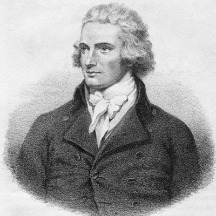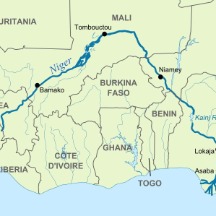Many Americans know the patriotic story of 1803 explorers Meriwether Lewis and William Clark but not the African tale of 1795 explorer Mungo Park. Lewis and Clark were the Mungo Park of North America.
Parks detailed his travels in the 1799 "Travels in the Interior of Africa." "It's The Gambia's untold contribution to the Age of Exploration," commented Hassoum Ceesay, the director at Gambia's National Centre for Arts and Culture. After publication, tales from Park's exploration became a best-seller, giving Europeans a glimpse of the "dark" continent.
Park’s story, which I first learned about in The Gambia, reveals much about his thoughts on the behavior of Negroes, Moors, and Arabs; African wars; his geographical missteps; African words in modern English; African slavery; Middle Passage survival; and the interconnectedness of African, European, and American history.
France was in control of much of Europe during this period, invaded Egypt and Syria (1798–1801) and fought with the Americans against the British at the Siege of Savannah Georgia (1779); only to be defeated by African descendants in the Haiti Revolution (1804) - - the world’s only successful slave revolt.
In 1795 the London-based Association for Promoting the Discovery of the Interior Parts of Africa had Park follow Major Daniel Houghton's search for the course of the Niger River, locally called Jolliba (the great water). Moors had killed Houghton during his explorations in 1790.
Generally, Parks described his relationships with Negroes as being better than those he had with Arabs and Moors. He generally distrusted the Moors. It was women of all races, he pointed out, that showed him compassion when he needed it most, especially poor and enslaved women.
On several occasions, he wrote similar passages: "Towards evening, as I was sitting upon the Bentang, chewing straws, an old female slave, passing by with a basket upon her head, asked me 'if I had got my dinner.' As I thought she only laughed at me, I gave her no answer; but my boy, who was sitting close by, answered for me, and told her that the king's people had robbed me of all my money. On hearing this, the good old woman, with a look of unaffected benevolence, immediately took the basket from her head, and showing me that it contained ground nuts, asked me if I could eat them; being answered in the affirmative, she presented me with a few handfuls, and walked away before I had time to thank her for this seasonable supply."
However, his allusions to Africans warring with neighboring nations as a significant cause of African suffering were less flattering and seemed nearsighted in light of his being in and out of Africa during the French Revolutionary Wars (1792-1802).
The French Wars were a series of conflicts that arose from the tensions surrounding the French Revolution (1789-1799) as Revolutionary France fought with several European powers, most notably Austria, Prussia, Russia, Spain, and Great Britain.
France controlled much of Europe during this period, invaded Egypt and Syria (1798–1801), and fought with the Americans against the British at the Siege of Savannah, Georgia (1779). However, African descendants defeated them in the Haiti Revolution (1804)—the world's only successful slave revolt.
Like Columbus, he also asserted a major geographical flaw. He initially declared that the Niger River flowed east, which it does for the portions he initially saw. After flowing east, it flows south into the Atlantic.
His descriptions of slavery were more appalling. Parks described slavery practiced by Africans to be all-pervading and having a set of rules, that when followed, were oppressive but not as oppressive as slavery practiced by most Europeans in the Americas. However, it could as brutal.
Take the case of Neale:
While reading this page-turner, familiar words struck me. The phrase, “Strike me, but do not curse my mother,” reminded me that most Black Americans know that having one’s opponent say anything bad about one’s mother is a call to fight. One of the other words was Mumbo Jumbo.
Mungo Park, the Lewis and Clark of West Africa
Features


Mumbo Jumbo was a "strange minister of justice" in Mandingo towns called in to settle disputes between a man's multiple wives. After the crowds gather and there is much commotion, Mumbo Jumbo fixes on the offender. The unfortunate victim is then immediately seized, stripped naked, tied to a post, and severely scourged with Mumbo's rod. Park surmised this was a tactic to keep women in subjection.
Just as Park had interpreters and guides Johnson and Demba, Lewis and Clark had interpreter and guide Sacagawea. Johnson was once enslaved in Jamaica, moved to England with his master, and eventually made it back to The Gambia.
His descriptions of slavery were more horrific. Parks described slavery as practiced by Africans to be all-pervading. It had a set of rules that, when followed, were oppressive but not as stifling as slavery practiced by most Europeans in the Americas. However, it could be brutal.
Take the case of Neale: "had not walked above a mile, when one of Karfa's domestic slaves came up to me, with poor Nealee's garment upon the end of his bow, and exclaimed (in Mandinka), 'Nealee affeeleeta,' (Nealee is lost.)
I asked him whether the Slatees (African slave merchants) had given him the garment as a reward for cutting her throat; he replied, that Karfa and the schoolmaster would not consent to that measure, but had left her on the road, where undoubtedly, she soon perished, and was probably devoured by wild beasts."
According to Parks, the trip from Goree to Charleston, but forced to land in Antigua, included 137 enslaved Africans, 25 were of "free condition," while living in Africa, meaning 112 were already enslaved in Africa by Africans. Most of those of "free condition" were Bushreens (Muslims) and could write Arabic like Ayuba Suleiman Diallo (Job ben Solomon).
Neale never made it to the Americas with Parks. Many others did not either. Parks notes that three of the enslaved died in The Gambia, six or eight at Goree, and 11 at sea. Four of the seamen and the surgeon also died before they reached Goree.
During this age of European exploration, the African Society funded Park to explore West Africa, while the United States government funded Lewis and Clark to explore the United States' western territories. Just as Park had interpreters and guides Johnson and Demba, Lewis and Clark had interpreter and guide Sacagawea. Johnson was once enslaved in Jamaica, moved to England with his master, and eventually made it back to The Gambia. Sacagawea was born Agaidika, stolen by the Hidatsa, and sold to a French-Canadian for marriage at age 13.
Park's account underscores the interconnectedness of world affairs in multiple ways. The interconnected tidbit that struck me most was that his sponsor, the African Society, was an anti-slavery organization. Its members included William Wilberforce, the namesake of America's oldest, private, and historically Black University owned and operated by African Americans.
Note: I finished reading this book and prepared for my second on Gambian history, with feelings and thoughts that need revision. It reminds me of sitting in Goree with my friend Kevin Turner, a lawyer by profession and benefactor of the "From These Shores" permeant exhibit in The Gambia, and other Black tourists whom the tour guide creatively segregated from the non-Blacks.
Kevin succinctly asked the guide, "So, what do you tell the tourists about African involvement in the slave trade?" The guide ducked the question. The small courtyard was silent.
Secondly, the book underscores that the subjugation of human beings continues unfettered. We see, for instance, Right to Work laws throughout the old Confederacy, states that fought to maintain slavery during the American Civil War.
Lastly, I recall a Facebook discussion with followers Rick Patrick and Martha Turner on how indoctrination (or is it essential parenting?) from birth separates us from our true and divine selves. Is allowing each person to find themselves and create their destiny challenging? We all know who encourages and benefits from indoctrination.
Just as Park had interpreters and guides Johnson and Demba, Lewis and Clark had interpreter and guide Sacagawea. Johnson was once enslaved in Jamaica, moved to England with his master, and eventually made it back to The Gambia.
His descriptions of slavery were more horrific. Parks described slavery as practiced by Africans to be all-pervading. It had a set of rules that, when followed, were oppressive but not as stifling as slavery practiced by most Europeans in the Americas. However, it could be brutal.
Take the case of Neale: "had not walked above a mile, when one of Karfa's domestic slaves came up to me, with poor Nealee's garment upon the end of his bow, and exclaimed (in Mandinka), 'Nealee affeeleeta,' (Nealee is lost.)
I asked him whether the Slatees (African slave merchants) had given him the garment as a reward for cutting her throat; he replied, that Karfa and the schoolmaster would not consent to that measure, but had left her on the road, where undoubtedly, she soon perished, and was probably devoured by wild beasts."
According to Parks, the trip from Goree to Charleston, but forced to land in Antigua, included 137 enslaved Africans, 25 were of "free condition," while living in Africa, meaning 112 were already enslaved in Africa by Africans. Most of those of "free condition" were Bushreens (Muslims) and could write Arabic like Ayuba Suleiman Diallo (Job ben Solomon).
Neale never made it to the Americas with Parks. Many others did not either. Parks notes that three of the enslaved died in The Gambia, six or eight at Goree, and 11 at sea. Four of the seamen and the surgeon also died before they reached Goree.
During this age of European exploration, the African Society funded Park to explore West Africa, while the United States government funded Lewis and Clark to explore the United States' western territories. Just as Park had interpreters and guides Johnson and Demba, Lewis and Clark had interpreter and guide Sacagawea. Johnson was once enslaved in Jamaica, moved to England with his master, and eventually made it back to The Gambia. Sacagawea was born Agaidika, stolen by the Hidatsa, and sold to a French-Canadian for marriage at age 13.
Park's account underscores the interconnectedness of world affairs in multiple ways. The interconnected tidbit that struck me most was that his sponsor, the African Society, was an anti-slavery organization. Its members included William Wilberforce, the namesake of America's oldest, private, and historically Black University owned and operated by African Americans.
Note: I finished reading this book and prepared for my second on Gambian history, with feelings and thoughts that need revision. It reminds me of sitting in Goree with my friend Kevin Turner, a lawyer by profession and benefactor of the "From These Shores" permeant exhibit in The Gambia, and other Black tourists whom the tour guide creatively segregated from the non-Blacks.
Kevin succinctly asked the guide, "So, what do you tell the tourists about African involvement in the slave trade?" The guide ducked the question. The small courtyard was silent.
Secondly, the book underscores that the subjugation of human beings continues unfettered. We see, for instance, Right to Work laws throughout the old Confederacy, states that fought to maintain slavery during the American Civil War.
Lastly, I recall a Facebook discussion with followers Rick Patrick and Martha Turner on how indoctrination (or is it essential parenting?) from birth separates us from our true and divine selves. Is allowing each person to find themselves and create their destiny challenging? We all know who encourages and benefits from indoctrination.
Advertisers | Contact Us | Events | Links | Media Kit | Our Company | Payments Pier
Press Room | Print Cover Stories Archives | Electronic Issues and Talk Radio Archives | Writer's Guidelines






